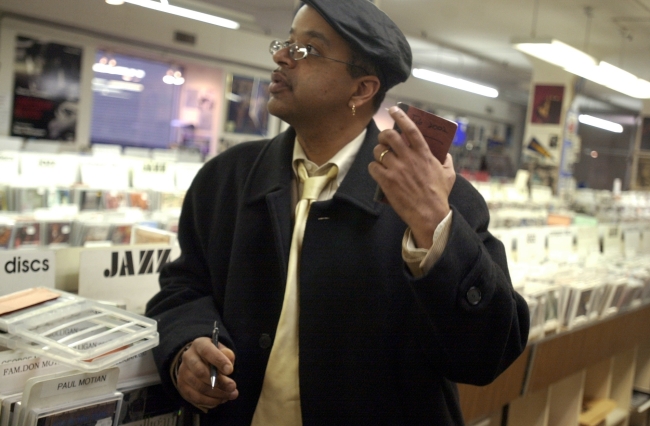James McBride tells how he resurrected John Brown in ‘Good Lord Bird’
By Claire LeePublished : Dec. 19, 2013 - 19:26

Conjure the image of John Brown in your head and you see the fearsome emancipator, a righteous prophet who gave his life to fight slavery with the Harpers Ferry raid of 1859. The Union turned his death into a rallying cry with the anthem “John Brown’s Body.” His soul is marching on.
Brown’s story might have moved from history to legend, but it still contains some truth. It’s also ripe for mischievous revision, which is exactly what James McBride provides in his National Book Award-winning novel “The Good Lord Bird”(Riverhead).
McBride’s Brown annoys his men to no end with interminable prayer. His fiery determination to free the slaves far outstrips his ability to focus on realistic tasks ― like, say, seizing the armory at Harpers Ferry. Most of the downtrodden souls he seeks to help want little to do with him.
“The guy was crazy,” McBride says during an interview at the Texas Book Festival. “He was a madman. But we’re still talking about him, and I kind of fell in love with him a little bit.”
McBride, 56, was at the festival not just to read but also to perform gospel and blues standards with his Good Lord Bird Band. That explains his gray suit and tan Panama hat. “You don’t think I’m gonna go around looking like the Blues Brothers all day, do you?” he quips.
The man has style, as does his prose.“The Good Lord Bird”reads like an unholy collaboration between Mark Twain and Richard Pryor: plain-spoken, profane and bitingly ironic.
The gallows laughter springs from the narrator, a 10-year-old slave boy freed more or less against his will by Brown. Mistaken for a girl and rechristened “Onion,” he rides with the crazy white man and his ragtag troops from 1856 to 1859. Onion is intent on staying alive at any cost to his dignity. Or, as he puts it, “I liked being coddled by Yanks and rebels for doing nothing but shoving biscuits down my throat, and being led ’bout by the Old Man, who took care of me.”
A journalistic prologue tells us Onion dictated his tale to an amateur historian when he was 103 years old, and it was found years after his death. That combination of old codger and young scamp gives Onion’s voice the flowing, colloquial quality of a black Huck Finn.
“I love Mark Twain,” McBride says. “I love that voice of an old country man telling a whopper with fries. It’s like the blues. There’s nothing like the simplicity of a straight 12-bar blues. That’s what this book is, in some ways.”
If it’s the blues, it also has the jazzy flair of improvisation. Here’s Onion on Brown’s men facing a hard winter: “The Pottawatomie Rifles weren’t nothing but a bunch of hungry boys with big ideas running ‘round looking for boiled grits and sour bread to stuff their faces with in late February.” Frederick Douglass has a cameo and impresses Onion mostly with his appetite: “That man could put a hurting on a kitchen.” And later, when Douglass wisely refuses to join the raid: “There’s weren’t no way Mr. Douglass could’a brung hisself to fight a real war. He was a speeching parlor man.”
Onion’s blues can make you laugh out loud, but the book’s haunting undercurrent of detachment and distrust gives it heft.
“The level of distrust between whites and blacks in this country is something that is really hard to talk about,” McBride says. “John Brown shows up and says, ‘I’m gonna free every black person here,’ and every black person there jumps up and runs out of the room. That’s funny, and it probably happened. I can’t say it definitively happened, but that’s one of the things fiction allows you to do. It allows you to discuss things that are really hard to discuss.”
By Chris Vognar
(The Dallas Morning News)
(MCT Information Services)
Brown’s story might have moved from history to legend, but it still contains some truth. It’s also ripe for mischievous revision, which is exactly what James McBride provides in his National Book Award-winning novel “The Good Lord Bird”(Riverhead).
McBride’s Brown annoys his men to no end with interminable prayer. His fiery determination to free the slaves far outstrips his ability to focus on realistic tasks ― like, say, seizing the armory at Harpers Ferry. Most of the downtrodden souls he seeks to help want little to do with him.
“The guy was crazy,” McBride says during an interview at the Texas Book Festival. “He was a madman. But we’re still talking about him, and I kind of fell in love with him a little bit.”
McBride, 56, was at the festival not just to read but also to perform gospel and blues standards with his Good Lord Bird Band. That explains his gray suit and tan Panama hat. “You don’t think I’m gonna go around looking like the Blues Brothers all day, do you?” he quips.
The man has style, as does his prose.“The Good Lord Bird”reads like an unholy collaboration between Mark Twain and Richard Pryor: plain-spoken, profane and bitingly ironic.
The gallows laughter springs from the narrator, a 10-year-old slave boy freed more or less against his will by Brown. Mistaken for a girl and rechristened “Onion,” he rides with the crazy white man and his ragtag troops from 1856 to 1859. Onion is intent on staying alive at any cost to his dignity. Or, as he puts it, “I liked being coddled by Yanks and rebels for doing nothing but shoving biscuits down my throat, and being led ’bout by the Old Man, who took care of me.”
A journalistic prologue tells us Onion dictated his tale to an amateur historian when he was 103 years old, and it was found years after his death. That combination of old codger and young scamp gives Onion’s voice the flowing, colloquial quality of a black Huck Finn.
“I love Mark Twain,” McBride says. “I love that voice of an old country man telling a whopper with fries. It’s like the blues. There’s nothing like the simplicity of a straight 12-bar blues. That’s what this book is, in some ways.”
If it’s the blues, it also has the jazzy flair of improvisation. Here’s Onion on Brown’s men facing a hard winter: “The Pottawatomie Rifles weren’t nothing but a bunch of hungry boys with big ideas running ‘round looking for boiled grits and sour bread to stuff their faces with in late February.” Frederick Douglass has a cameo and impresses Onion mostly with his appetite: “That man could put a hurting on a kitchen.” And later, when Douglass wisely refuses to join the raid: “There’s weren’t no way Mr. Douglass could’a brung hisself to fight a real war. He was a speeching parlor man.”
Onion’s blues can make you laugh out loud, but the book’s haunting undercurrent of detachment and distrust gives it heft.
“The level of distrust between whites and blacks in this country is something that is really hard to talk about,” McBride says. “John Brown shows up and says, ‘I’m gonna free every black person here,’ and every black person there jumps up and runs out of the room. That’s funny, and it probably happened. I can’t say it definitively happened, but that’s one of the things fiction allows you to do. It allows you to discuss things that are really hard to discuss.”
By Chris Vognar
(The Dallas Morning News)
(MCT Information Services)








![[From the Scene] Monks, Buddhists hail return of remains of Buddhas](http://res.heraldm.com/phpwas/restmb_idxmake.php?idx=644&simg=/content/image/2024/04/19/20240419050617_0.jpg&u=20240419175937)





![[From the Scene] Monks, Buddhists hail return of remains of Buddhas](http://res.heraldm.com/phpwas/restmb_idxmake.php?idx=652&simg=/content/image/2024/04/19/20240419050617_0.jpg&u=20240419175937)

![[KH Explains] Hyundai's full hybrid edge to pay off amid slow transition to pure EVs](http://res.heraldm.com/phpwas/restmb_idxmake.php?idx=652&simg=/content/image/2024/04/18/20240418050645_0.jpg&u=20240419100350)

![[Today’s K-pop] Illit drops debut single remix](http://res.heraldm.com/phpwas/restmb_idxmake.php?idx=642&simg=/content/image/2024/04/19/20240419050612_0.jpg&u=)